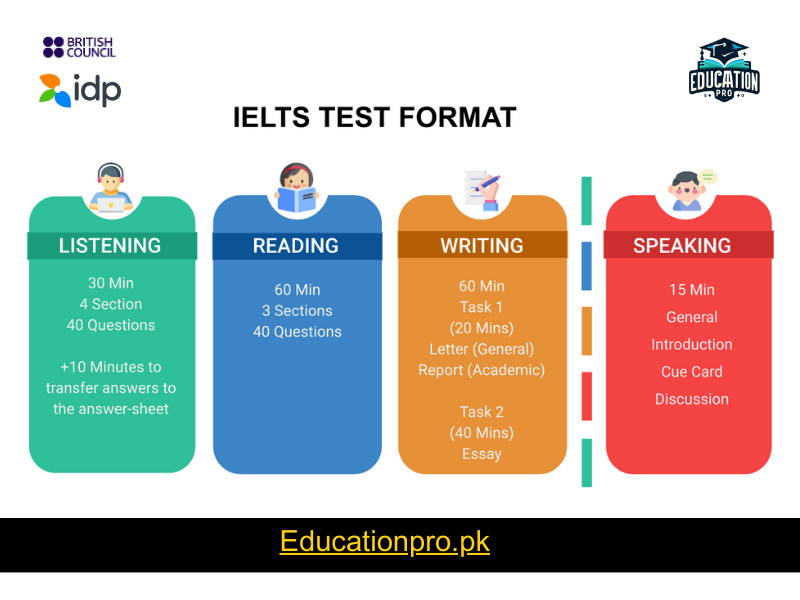The Ultimate Guide to IELTS
Taking the IELTS (International English Language Testing System) exam can be pivotal for anyone looking to study, work, or migrate to an English-speaking country. It’s more than just a test; it’s a gateway to global opportunities and a chance to demonstrate a profound command of English. This comprehensive guide will explore every facet of the IELTS and offer an in-depth look at how to prepare and excel, whether you’re a student, teacher, educational institution, medical professional, engineer, or parent.
Introduction to IELTS
IELTS is widely recognized as a rigorous and respected test of English language proficiency. Used by academic institutions, employers, and governments as a benchmark of English understanding, a strong IELTS score can be the key to accessing a world of academic and professional opportunities.
The Four Modules of IELTS
The IELTS test assesses candidates across four critical skill areas:
- Listening: This module tests your ability to comprehend spoken English in various situations.
- Reading: In this section, examinees prove their skill in reading and understanding written English.
- Writing: Here, an individual’s ability to express themselves in writing is measured.
- Speaking: This module evaluates a candidate’s spoken English ability in a face-to-face interview setting.
Each module is designed to reflect real-life use of English, from study to work to everyday life, and each holds equal weight in calculating the candidate’s final band score.

Understanding IELTS Bands
The IELTS is scored on a scale of 1 to 9 bands. The higher the band, the higher a test taker’s English proficiency is considered to be:
- 9 Bands: Expert user
- 8 Bands: Very good user
- 7 Bands: Good user
- 6 Bands: Competent user
- 5 Bands: Modest user
- And so on
Each of the four modules receives a band score, and the average of these becomes your overall IELTS band score.

Bands Distribution
The Listening, Reading, and Writing modules all consist of a variety of tasks, each contributing to your final band score in that module. The Speaking module is a face-to-face interaction with an examiner and is graded more holistically.
Booking Your IELTS Test
The booking process can be completed on the official IELTS website or through affiliated institutions. Booking would typically require you to select a test date and whether you are taking IELTS Academic for higher education or General Training for migration purposes.
Online IELTS Versus Paper-Based IELTS
The IELTS can be taken as a paper-based or an online test. The choice comes down to personal preference, as the format and content of the test are the same.
The Paper-Based IELTS and Computer-Delivered IELTS are two formats available for candidates, each designed to cater to different preferences and offer flexibility in taking the exam. Here’s a closer look at both:
Paper-Based IELTS: This traditional format involves taking the Listening, Reading, and Writing sections on paper. The Speaking test is conducted face-to-face with an examiner. Candidates often choose the paper-based test for the tactile feel of writing responses on paper and for those who prefer the conventional method of examination. It’s important to note that for the paper-based format, test dates might be less frequent compared to the computer-delivered option, and the results are released 13 days after the test.
Computer-Delivered IELTS: Introduced as a modern alternative, the computer-delivered IELTS allows candidates to complete the Listening, Reading, and Writing sections using a computer. The Speaking test remains face-to-face. This format is gaining popularity for its frequent test dates and quicker result delivery—often within 3 to 5 days. The computer-delivered option is ideal for individuals comfortable typing and looking for more flexibility in scheduling their tests.
Both formats are maintained under strict quality control to ensure consistency and fairness in the testing process. The choice between paper-based and computer-delivered IELTS ultimately depends on personal comfort with the test medium and individual preparation strategies. Regardless of the chosen method, thorough preparation is crucial for success in achieving an optimal IELTS score.
Institutes Conducting IELTS
IELTS is conducted globally by two main bodies – British Council and IDP. Both offer the test in multiple locations across the globe and provide preparation resources.
The two main institutions that conduct the International English Language Testing System (IELTS) exam, the British Council and IDP: IELTS Australia, play a critical role in ensuring the accessibility and standardization of the test globally.
British Council is the UK’s international organization for cultural relations and educational opportunities. It offers IELTS testing in more than 140 countries, including over 1,600 test locations worldwide. The British Council also provides a wealth of preparation materials, including free online courses, practice tests, and workshops, to help candidates prepare for their exam.
IDP: IELTS Australia is a global leader in international education services. It co-owns IELTS along with the British Council and Cambridge Assessment English. IDP offers the test in more than 50 countries and provides a range of preparation resources, including sample tests, preparation tips, and on-demand webinars. IDP also offers the convenience of booking the test date and location through its easy-to-navigate website.
Both these institutions ensure that the IELTS remains fair, reliable, and accessible to all who wish to undertake it. Their global networks facilitate a seamless test-taking experience, whether for academic or general training purposes. Additionally, both IDP and the British Council are committed to maintaining the highest standards of test administration, employing trained and certified examiners to ensure the integrity of the test results.
IELTS Registration
Candidates must register for the IELTS test either online or in person at a registered test centre. Ensure that you have proof of identity, often a passport, ready when you register.
Choosing the right IELTS preparation course is crucial for success in the IELTS exam. Whether it’s for IELTS Academic or IELTS General Training, numerous options are available, including IELTS online test preparation and face-to-face courses. These courses offer comprehensive training covering all sections of the test—Listening, Reading, Writing, and IELTS Speaking. Most IELTS preparation online resources are designed to familiarize you with the International English Language Testing System (IELTS) format, giving you the strategies needed to tackle each type of question you’ll encounter.
When it comes to IELTS test booking, both the British Council and IDP: IELTS Australia offer easy IELTS booking systems through their websites, making it straightforward to find and register for your exam at a convenient location and time. It’s essential to book your IELTS exam booking in advance to secure your preferred date, especially if you’re planning to take the test for specific purposes like UKVI IELTS or IELTS UKVI applications, which have specific requirements.
For those considering an IELTS course, it’s beneficial to look into all options, including IELTS preparation online. These can provide flexible and accessible ways to improve your English skills and prepare for the IELTS effectively, regardless of your schedule or location. Ultimately, whether you opt for an in-person class or an online IELTS test prep course, ensuring you have comprehensive IELTS preparation is the key to achieving a high score in your IELTS and opening doors internationally for education and career opportunities.
Booking Your IELTS Test
The booking process can be completed on the official IELTS website or through affiliated institutions. Booking would typically require you to select a test date and whether you are taking IELTS Academic for higher education or General Training for migration purposes.
Preparing for IELTS
Preparation is vital for success in the IELTS. This involves familiarizing yourself with the test format, practicing each module, and enhancing your English skills.
- Understand the test format.
- Complete practice tests.
- Create a study schedule.
- Engage in listening, reading, speaking, and writing in English regularly.
- Take advantage of IELTS preparation online resources and courses.

Understanding How IELTS Results are Calculated
IELTS results are calculated with meticulous attention to detail, ensuring a fair assessment of your English proficiency. Each of the four modules (Listening, Reading, Writing, and Speaking) is scored individually on a band scale from 1 to 9. These individual scores are then averaged and rounded to produce your overall band score. It’s crucial to understand that there is no pass or fail in IELTS; instead, institutions or organizations set their score requirements based on their specific needs.
Conclusion on IELTS
A solid IELTS score can make a world of difference, opening doors to education and employment in English-speaking countries. With proper preparation, familiarisation with the test, and a clear understanding of the format and expectations, anyone can overcome this challenge.
For those aiming for the stars with their IELTS score, begin your preparation today, stay committed to your goal, and remember, every step taken is a step closer to success in IELTS!
What to Bring on Test Day
The IELTS test day is a significant milestone in your preparation pathway, and knowing what to bring can ease your stress. First and foremost, ensure you have the valid ID (usually a passport or national ID card) that you used for registration. Without it, you will not be allowed to take the test. Additionally, bring a few pencils, an eraser, and a sharpener for the paper-based test, as you will need to fill in answers on an answer sheet. Although pens are provided for the Writing module, having your own can provide a sense of preparedness. For the computer-based test, you’ll only need your ID as the test center will provide the necessary equipment. Personal items such as mobile phones, smart watches, and other electronic devices are not allowed in the test room, so be prepared to store them in the lockers provided at the test center.
Frequently Asked Questions (FAQs) about IELTS
Preparing for IELTS comes with numerous questions. Here are some common FAQs:
- Q: How often can I take the IELTS test?
A: You can take the test as many times as you like. However, it’s recommended to take adequate preparation time between attempts.
- Q: How long is my IELTS score valid?
A: IELTS scores are valid for two years from the test date.
- Q: Can I retake only one section of the test if I’m not satisfied with my score?
A: No, if you decide to retake the test, you must retake all four sections.
- Q: What is the difference between the Academic and General Training tests?
A: The Academic test is designed for those planning to study in an English-speaking environment, while the General Training test is for migration, work, and training purposes.
Tips for IELTS Test Day
The day of your IELTS test can be nerve-wracking, but being well-prepared can help alleviate some of that stress. Here are some practical tips to ensure you’re ready for test day:
- Get a Good Night’s Sleep: Ensure you’re well-rested before your test day. Avoid cramming the night before, as this can impact your concentration and ability to perform.
- Eat a Healthy Breakfast: A nutritious breakfast will help keep your energy levels up and help you concentrate during the test.
- Arrive Early: Aim to arrive at the test center at least 30 minutes before your test is due to start. This will give you enough time to settle in and go through any necessary administrative procedures.
- Wear Comfortable Clothing: Choose clothing that you’ll be comfortable sitting in for extended periods. However, check if there are any dress codes at your test center.
- Breathe and Stay Calm: It’s normal to feel nervous, but try to stay calm. Practice deep breathing exercises or meditate to relax your mind before the test starts.
By following these tips and with thorough preparation, you’ll be well on your way to achieving a score that reflects your true ability in the IELTS test. Remember, preparation is key, and understanding the test format inside out will give you the confidence you need on test day. Good luck!

